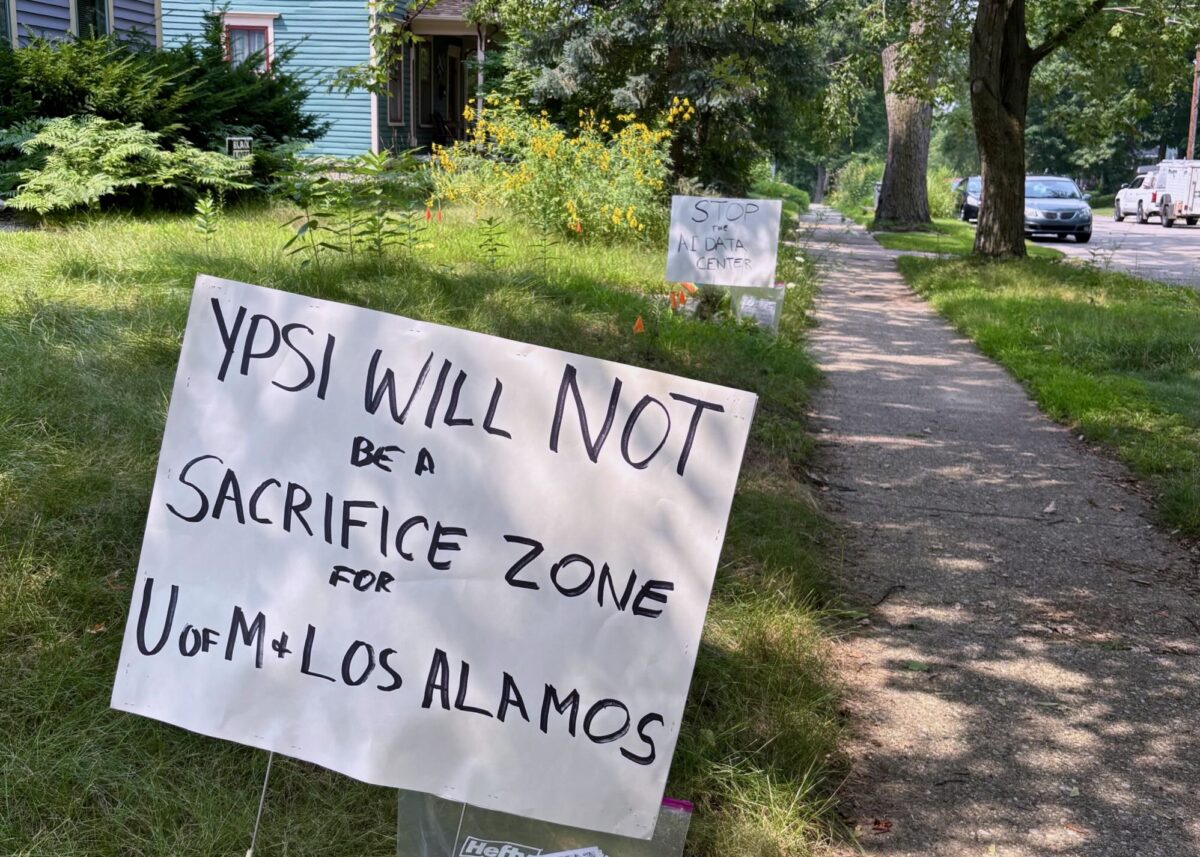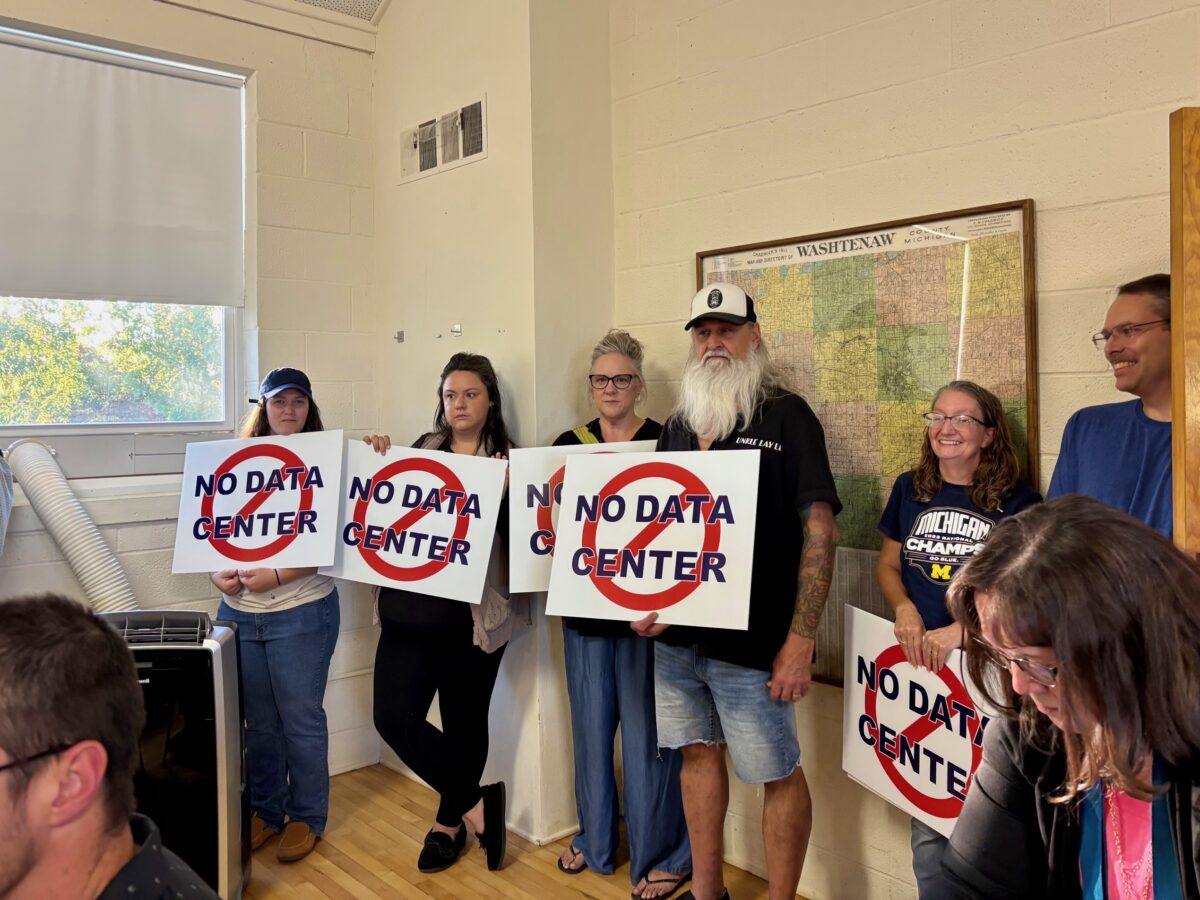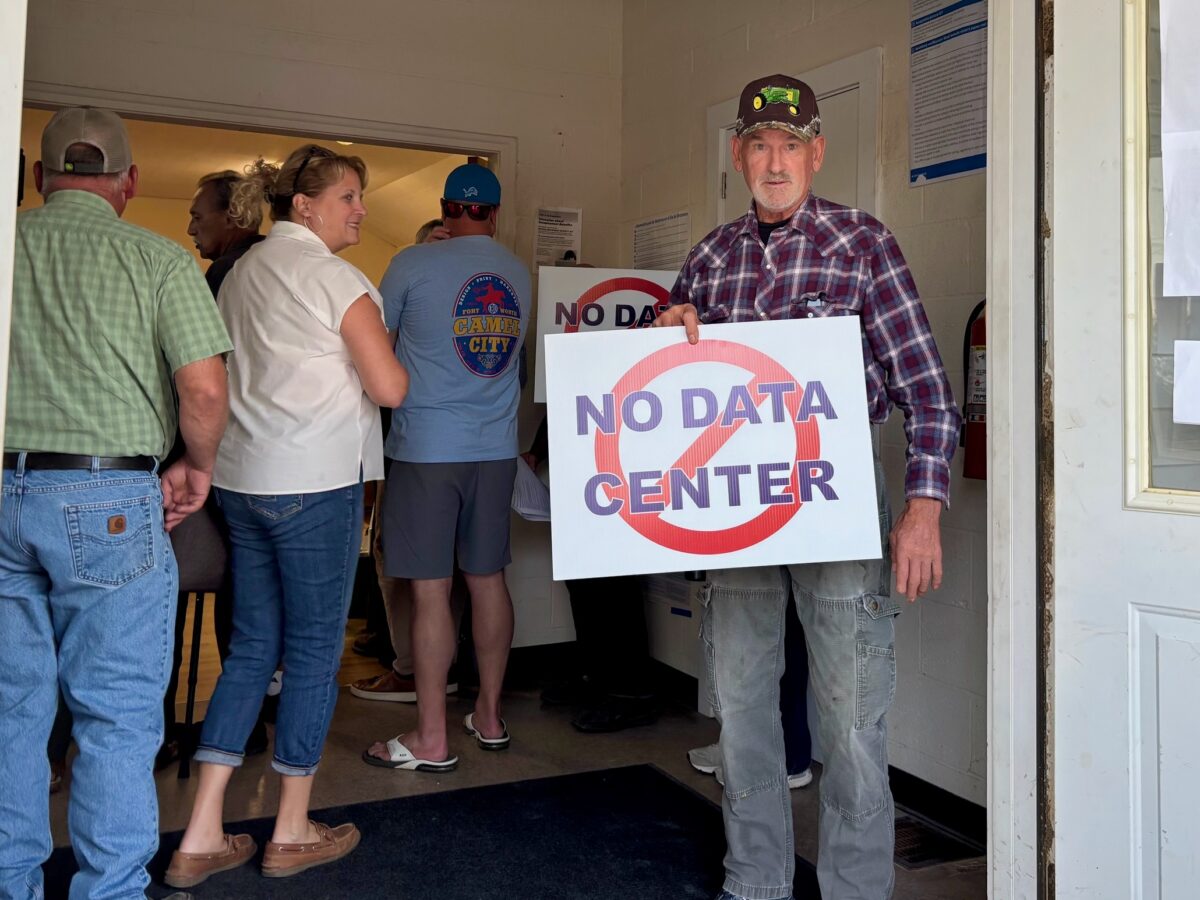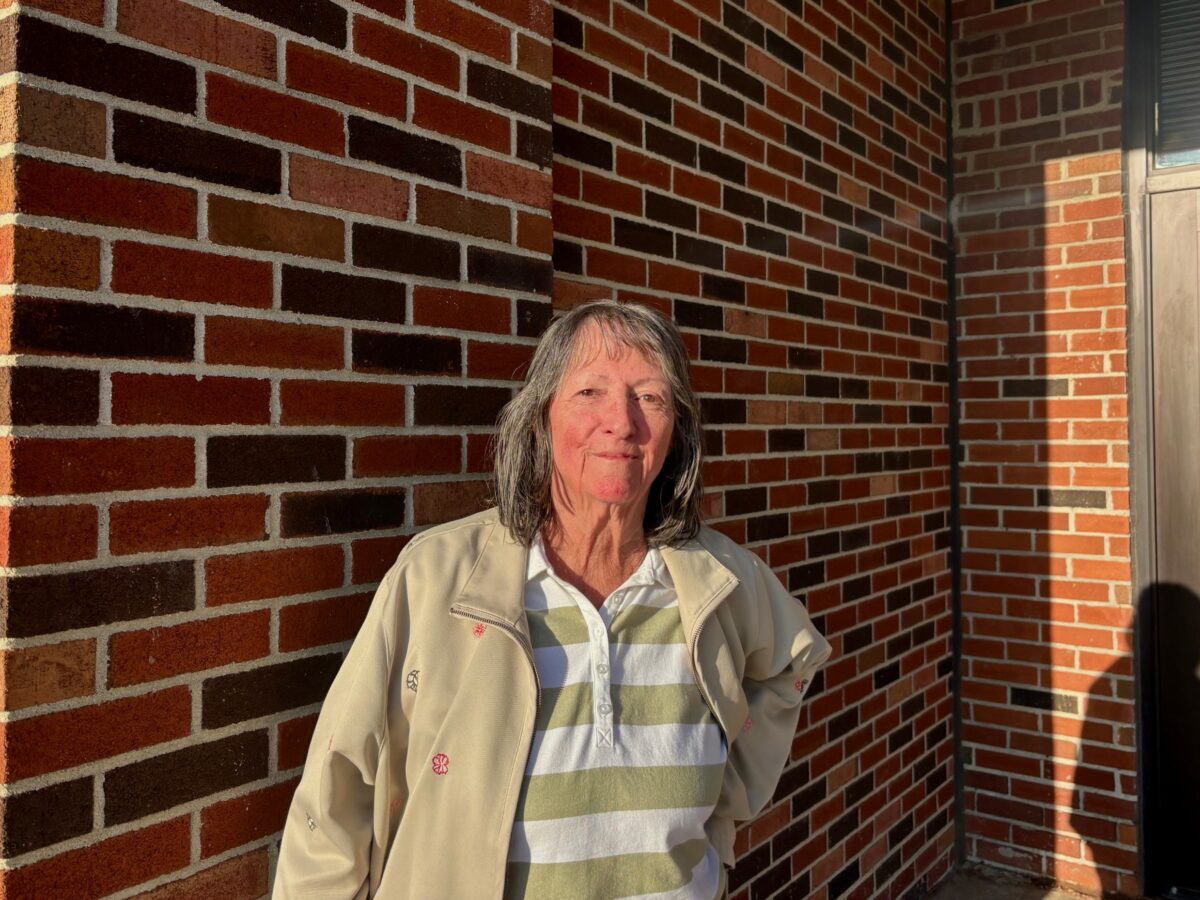Overview:
- Data center proposals are pouring into Washtenaw County.
- Augusta Township residents learned this week that a ballot drive is moving forward that would allow voters to decide on rezoning for a $1 billion data center development.
- Data center developer Related Digital sued Saline Township after the board rejected the rezoning of 575 acres for a data center.
A flurry of data center proposals are striking a nerve in Washtenaw County, where residents worry about impacts to water resources, air quality, utility bills, and climate goals, as well as the outsize influence big actors have in small communities.
“These are big corporations that are looking for the cheapest, quickest, least resistant places to build their data centers,” Washtenaw County Commissioner Shannon Beeman (D-Manchester) said during a commission meeting last week.
Companies are entering rural communities because they have fewer land use restrictions than more industrialized areas, and expect local officials to be “soft touches,” she said.
“They have the wrong assumption,” Beeman said. “We’re not soft touches.”
Beeman’s district includes Saline Township, which voted down the rezoning of 575 acres for a data center Sept. 10. The landowners and developer Related Digital filed suit against the township days later.
To the east of Saline Township, Augusta Township residents learned during Tuesday’s board meeting that a ballot drive secured enough signatures to move forward with allowing voters to decide on the rezoning for a $1 billion data center project.
The University of Michigan and Los Alamos National Laboratory’s plans for a $1.2 billion data center in Ypsilanti Township have drawn criticism — from township officials who say they were cut out of the planning process, and activists who fear the project will be used for the development of surveillance and drone warfare technologies.
Unlike the other two Washtenaw County projects, the university is exempt from paying local taxes.
The Ypsilanti Township board voted in August in favor of a resolution urging U of M and Los Alamos to evaluate a new site for the project near Willow Run Airport.
Data center demand could trigger climate law off-ramp
The proposals force local officials to weigh in on massive developments that, in the case of the Saline and Augusta projects, could bring significant local tax revenue — and transform rural landscapes.
Some Augusta and Saline residents voiced their support at meetings due to the tax revenue and other benefits companies promise, while others are pressuring elected officials to fight the developments.
They have raised concerns about impacts to water resources, energy reliability, and utility costs from the facilities, which can use as much energy as small cities and hundreds of thousands of gallons of water a day.
DTE Energy has closed on data center deals or is in talks with large technology companies to supply as much as 7 gigawatts of power for proposed data centers, according to the company’s July earnings call.
DTE says its grid capacity is roughly 11 GW. The utility delivered a peak of 10.1 GW to its users in 2022, according to the Michigan Public Service Commission, meaning the load growth from data centers could put the utility well over its capacity.
A DTE spokesperson previously told Planet Detroit in August the utility is confident that it can support data center growth and meet the state’s “ambitious” 2023 clean energy standard.
Additional renewable energy and baseload generation could be needed depending on the number of data centers that come to the state and their size, the spokesperson said. Baseload generation includes fossil fuel and nuclear power plants, which are designed to constantly generate large amounts of power.
This power demand could trigger an off ramp provision in the state’s climate law, allowing fossil fuel generation to stay online if there’s a capacity shortage. Consumers Energy has already cited data centers in rate case testimony as a reason it may be unable to meet state climate goals.
Climate scientists warn the world is already close to breaching the “carbon budget” that it needs to stay within to limit warming to the 1.5 degrees Celsius (2.7 Fahrenheit) level set by the Paris Agreement, the BBC reports. They argue rapid emissions cuts are needed to lessen the impact of extreme weather, melting ice, and sea level rise.
Tax breaks, climate, water drive data center growth: Washtenaw commissioner
Washtenaw County’s experience reflects a statewide surge in data center development, driven by the cooler climate, water and land availability, and tax breaks, Washtenaw County Commissioner Yousef Rabhi (D-Ann Arbor) told Planet Detroit.
“One of the main factors … is this massive incentive that the state has given for (data centers) to locate (here),” he said, referring to tax breaks passed in 2024 for large data centers. Rabhi argues the tax breaks are funding job-killing artificial intelligence infrastructure and should be overturned.
“We’re literally replacing humans with these data centers that are hurting our community, and we the taxpayers are paying the bill to make that happen,” Rabhi said.
Small townships are outgunned compared to large developers and tech industry giants, Rabhi said. Since zoning and planning authority are in the hands of municipalities, the county can only offer advice on how to proceed, he added.
Phil Santer, chief of staff for Ann Arbor Spark, an economic development organization, said data centers will bring substantial tax revenue to communities and less disruption than other developments.
“It’s higher impact in terms of what it could do in the community, but low impact in terms of its actual site use,” Santer said, adding that data centers are lower impact developments than battery plants, where hundreds of workers bring significant vehicle traffic.
Ann Arbor Spark lists the DTE Foundation, Google, and the University of Michigan as investors. Ann Arbor Spark did not respond to a follow-up request for comment on investors that are tied to data center developments.
Brent Behrman, CEO of Related Digital, said at the Sept. 10 Saline Township Board of Trustees meeting that he predicts the company’s proposed data center development will quadruple the township’s tax revenue and provide money for local schools.
MORE DATA CENTER REPORTING FROM PLANET DETROIT
Data center developer takes Saline Township to court over rezoning decision
Saline Township board’s denial of rezoning of farmland for data center project comes after outpouring of resident concerns over noise, traffic, and environmental impact.
Saline Township denies data center rezoning request: ‘Self-imposed environmental catastrophe’
Saline Township officials reject rezoning plan for a data center on 575 acres of farmland. Residents voiced fears over water use, pollution, and energy demands, while supporters highlighted potential tax revenue and community funding.
Can 957 signatures halt a $1 billion data center in Augusta Township?
Residents of Augusta Township rally to submit 957 signatures, aim to let voters decide on the rezoning of land for a data center.
Expert from data center capital says to ask for project specifics
Public officials and experts nationally have criticized the often-secretive nature of data center proposals and encouraged communities to request concrete data about the projects’ impacts.
In Virginia, which has the world’s highest concentration of data centers, municipalities have often failed to look beyond the expected tax revenue when approving projects, Julie Bolthouse, director of land use at the Virginia-based Piedmont Environmental Council, told Planet Detroit.
Virginia has hundreds of data centers. The facilities can have dozens of backup diesel generators, Bolthouse said.
The generators emit pollutants like carbon monoxide and nitrogen oxides, contributing to ozone formation, according to the Environmental Protection Agency.
Monitoring Analytics, the independent watchdog for mid-Atlantic grid operator PJM Interconnection, found that 70%, or $9.3 billion, of last year’s electricity price increase in the mid-Atlantic region is due to data center demand.
Communities that are fielding their first, large data centers should be asking key questions about square footage, water and energy uses, and emissions from generators, Bolthouse said.
“The vast majority of the applicants though … don’t want to answer those questions,” she said.
Washtenaw County Commissioner Rabhi and Ben Green, assistant professor of information at the University of Michigan, said they have concerns about the sometimes secretive nature of data center projects.
It’s impossible to obtain accurate information about how much water and energy operational data centers use, let alone for projects in the planning phase, Green said.
He gave Michigan’s experience with the Switch Inc. data center near Grand Rapids as an example of how projects receiving public support can fail to meet expectations, with little pushback.
This project received tax breaks in 2015 after the company estimated it would create 1,000 jobs in 10 years. By 2022, the company had hired 26 employees, Bridge Michigan reported last year.
Switch did not respond to a request for comment on its Michigan development.
State oversight may be tough sell for townships
State oversight could help small municipalities navigate large projects with limited resources, Virginia’s Bolthouse said.
Communities may bristle at state involvement after Michigan’s 2023 clean energy law gave the state final say over siting renewable energy projects, prompting pushback over the loss of some local control.
Local decision-making is inadequate for approving data centers due to the consequences for neighboring municipalities, Bolthouse said.
“A locality is not equipped to evaluate the scale and impacts of these kinds of projects,” she said, adding that small communities lack the ability to do air modeling to examine the impacts from diesel generators or assess their massive power use.
“There is no other land use that I know of that uses a city’s worth of power,” she said.
Although state oversight could face pushback, Bolthouse argues it would give voters a say in electing those who determine the fate of data centers in neighboring municipalities.
Laurie Fromhart, Bridgewater Township supervisor, criticized the speed with which the developer Related Digital tried to push through a data center in neighboring Saline Township.
Related first submitted its request for rezoning on July 10 and the company planned to begin construction in October.
“They want to rush it so no opposition can build against it,” she said.
Related spokesperson Natalie Ravitz said the company has been sharing information with officials and the public for months —and the more people learn, the more support the data center project gains.
“Since the beginning of this process many months ago, we have been forthcoming with (the) Board, Planning Commission and Township that our tenant is on a tight timeline for delivery of this data center project,” she said.
Saline Township will hold a special meeting at 7 p.m. Wednesday, Sept. 24 to discuss its response to Related’s lawsuit.
Fromhart said she sees regional planning as useful for fighting data centers in the area, which she said are an incompatible use for a rural area.
She opposes Michigan’s decision to give the state final say in renewable energy projects and disagrees with the suggestion that the state should play a bigger role in data center oversight.
“I think government closest to the people works best,” she told Planet Detroit.
Saline resident encourages communities to speak up: ‘Tell them how you feel about it’
In the absence of state oversight, regional planning and resident organizing are the primary forces shaping the outcome of data centers fights in Washtenaw County.
The Washtenaw County Board of Commissioners adopted a data center resolution last week to support local data center decisions that includes an offer of county help to collect data on expected water and energy use, noise, and other environmental impacts.
Commissioners would also help municipalities develop plans for public outreach in the form of information on expected impacts.
The resolution cites Michelle Martinez, director of the University of Michigan’s Tishman Center for Social Justice and the Environment, who said data centers could make it impossible for the county to achieve its 2035 net-zero goal and potentially raise the wholesale cost of electricity by 20%, increasing prices for area ratepayers.
Tim Bruneau, a Saline Township resident who’s organizing against the data center, said grassroots resistance is key to blocking data centers.
“You need to go to your planning commission and board meetings and tell them how you feel about it,” he said, adding that he thinks the community feedback is the only reason the township board voted against the data center rezoning.
Several of the public officials and advocates who spoke with Planet Detroit said repealing the state’s tax breaks would be an important step for reining in data centers.
Washtenaw Commissioner Rabhi said Michigan’s cool climate and water are already enticing to data centers, and the tax breaks are depriving roads and schools of badly needed funding.
“Why are we throwing money at them to come to Michigan when they want to come here anyways?”
The Associated Press contributed to this report.
🗳️ Civic next steps: How you can get involved
Why it matters
⚡ Data centers have large energy and water demands that environmental advocates argue could jeopardize Michigan water resources and state climate goals.
Who’s making civic decisions
🏛️ A lawsuit against the Saline Township board over its denial of a rezoning proposal that would allow for a large data center is assigned to Washtenaw County Circuit Judge Julia Owdziej.
The Washtenaw County Board of Commissioners passed a resolution to help townships navigate data center zoning, but some commissioners and community members say more is needed.
How to take civic action now
- 📅 Attend Attend Saline Township’s special meeting on the data center lawsuit on Wednesday, Sept. 24 or monthly board meetings.
- 📩 Contact Contact Saline Township board members or Washtenaw County Commissioners.
- 🗞️ Read Planet Detroit’s data center coverage and recent coverage of Ypsilanti Township, Saline Township, and Augusta Township data center proposals.
What to watch for next
🗓️ Hearings and rulings in the lawsuit filed by a data center developer against Saline Township. The outcome of the Augusta Township petition drive, which could put the decision on rezoning for a large data center in the hands of voters
Civic impact
🌍 Data center plans have met with opposition in several Washtenaw County communities. Saline Township’s decision shows some elected officials are prepared to block such projects.
⭐ Please let us know what action you took or if you have any additional questions. Please send a quick email to connect@planetdetroit.org.





